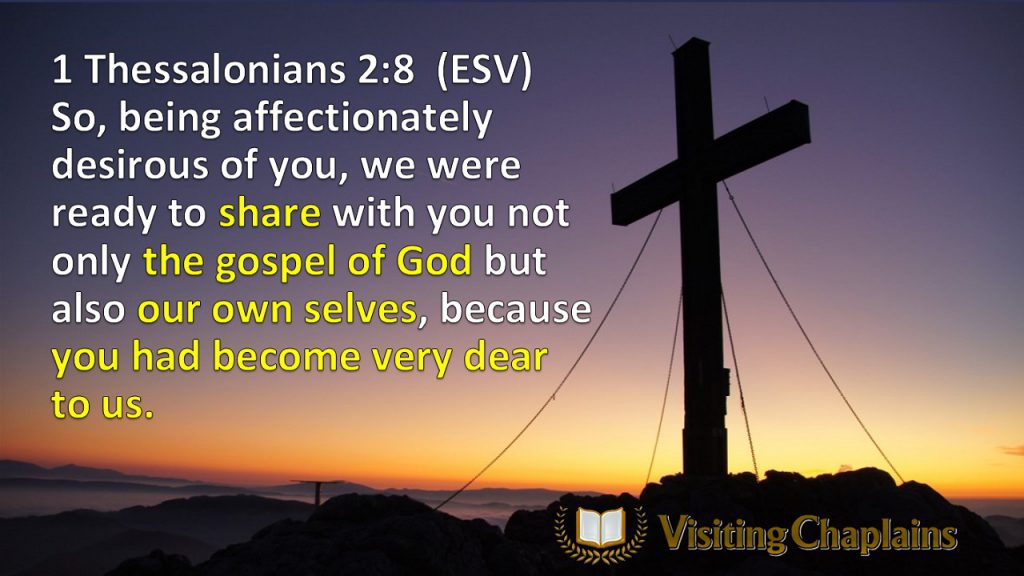CLINICAL PASTORAL EDUCATION, FAITH & THE CHURCH, VOCATION 1 Thessalonians 2:8

If there is a Bible verse to encapsulate what I have learned in my hospital chaplain residency this year, this is it:
. . . we are determined to share with you not only the gospel of God but also our own selves . . . [1 Thessalonians 2:8]
At the beginning of my residency I struggled with, but quickly accepted, the not-specifically-religious nature of my chaplaincy work (see The Cross and Hospital Chaplaincy). That is, as a hospital chaplain in a diverse setting, I am not there to be a Christian or a Lutheran chaplain. Rather, I am there to be a compassionate presence who can provide spiritual support (if requested), either by directly providing for religious needs (read Scripture, say a prayer, etc.) or by connecting patients with resources from their tradition (reading material, clergy, volunteer visitors).
It was hard, in one sense, to put down my Bible and my prayer book, for they symbolize the two sources of wisdom and teaching in my faith – Scripture and the Church’s tradition. But as 1 Thessalonians 2:8 shows, we share not only the Gospel but also ourselves. In my line of work as a hospital chaplain, but I imagine also as a parish pastor, it is the sharing of the self that comes first. I walk into a room and I present to the patient not my prayer book nor my Bible, but myself. “Hello, I’m Chris, one of the chaplains in the hospital. I’m here to check in with you, to see how you’re doing, to offer you some support while your here. How are you doing?” I think I have used my prayer book about four times since I began this program on September 1, and my Bible perhaps a dozen times. I have prayed more often, but even then it is not as much as I thought I would. For most of my patients it is relationship, not religion, that they’re looking for from a chaplain. (Why? That’s stuff for another post, but briefly – I imagine that the majority of my patients are not overtly religious; and the ones who are religious often have friends, family, church members and clergy who provide them with their religious needs. I do provide some religious services, but not nearly as much as I originally thought I would.)
As a congregational intern and eventually as a pastor, I will use my Bible and prayer book in pastoral care. But I think that I will use them less, and differently, than I would have prior to this residency. I have learned in this residency the power of a pastoral relationship, and have felt the incarnate love that is shared in such encounters. If tended with care, such relationships can become channels of comfort in which the living Word of God breaks in, the prayers of the saints echo, and the witness of the church shines brightly. Each situation is different, of course, but too quick a turn to Scripture or the prayer book can result in a disembodied religiosity that might dot holy i‘s and cross sacred t‘s while doing a disservice to the incarnate, living Word which comes to us in the flesh and demands of us a relationship.
